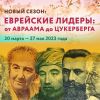Last week, Booknik read Mordecai Richler, Ted Chiang, and José Saramago, looked for a Jewish trace in the murder of the Great Prince (without success), marveled at Mickey Mouse over Roman ruins, and the art in Israeli streets, remembered Efraim Sevela, watched an action movie of the 80s made my Sylvester Stallone in 2010, mused on ethics, the power of words, and the love of reading, boiled some eggs, learned K-words, and trained to praise children. Booknik Jr. walked around Riga, Tallinn, Moscow, and Jerusalem, read about a boy who just went to school, and learned a few new things about King Solomon.
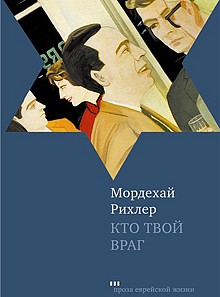
A Choice of Enemies, by Mordecai Richler
The main characters of Richler’s novel are the Western left intellectuals. They are not very nice to look at, not at all fortunate, and many of them are so obsessed with freedom that they easily fall prey to the same old McCarthy rhetoric trying to find “informers” in their own midst, that is, the people who inform the FBI on all conversations of those Western dissenters. Squabbles and quarrels, old grudges, and new fights over jobs, money, gossip, and women, all these turn former intellectuals into hysterics, and alcoholics. Booknik’s specialist in intercultural communications Masha Tuuborg reads the novel of memory and loss thereof, sees how the memory and its negation change the past and present, and muses if it is possible to start all over after everything you believed in has been destroyed.
The Babylonian Strip
The Merchant and the Alchemist's Gate: Stories of Your Life and Others, by Ted Chiang
The Möbius strip, an unexpected but quite natural twist of a plane—this is the form the human cognition takes in the short stories by Ted Chiang. His characters are not afraid to ask a “what if” question of themselves, and the world at large, and they get ambiguous answers. What if a language exists that does not have a time category, and there is only one word for the past, present, and future? What if our contemporary scientific outlook of the world is not right but the medieval is, that was no less scientific for its times? What if someone could travel to himself in a time machine, and tell about a hidden treasure or warn about some impending danger? Booknik reviewer Yevgeniya Ritz reads the short story collection by Ted Chiang, and asks impossible questions.
Apotheosis of the Mother of the Kingdom
The Annotated Book of Ruth
Ruth is the protagonist of an Old Testament book, the great-grandmother of King David. The newly published annotated edition of The Book of Ruth includes the original text in Hebrew, the new Russian translation, and the comments ranging from classic to contemporary. Booknik reviewer Yevgeny Levin reads and annotates this volume.
…and many other remarkable readings in the Books & Reviews section.
The Jewish Trace in the Murder of Andrei Bogolyubski
The summer of 1175 saw one of the most scandalous political assassinations in the ancient Russian history. On the night of June 28-29, the grandson of Vladimir Monomakh, and son of Yuri Dolgorukiy, the Great Prince of Vladimir Andrei Bogolyubski was murdered in his residence, the village of Bogolyubovo. With time, the Russian historiography started to believe that some persons in the Prince’s retinue were behind that assassination who professed Judaism. Booknik contributor Yevgeny Levin studies the academic monographs, and finds the beginnings of that unsubstantiated belief.
…and many other inquisitive investigations in the Articles & Interviews section.
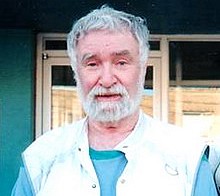
Efraim Sevela has passed away. He was the author, film director, and journalist, yet primarily he was a man extraordinaire. His generation has become truly historic, made of the people who survived the WW2, the Jews’ mass extermination in Europe, the Soviet dictatorship, unending emigrations, an eternal search for home, truth, and soul. Booknik contributor Ilya Kazachkov remembers the writer who was very important to him, and thinks about the honesty of characters, and their authors.
Mickey Mouse over the Roman Ruins, and Other Exquisite Pleasures
Caesarea attracts throngs of visitors any time of the year, but summer is special. Moreover, it is even more so because the Caesarea Development Corporation arranges merry and carefree events on all Saturdays in August. Booknik’s Israeli reporter Ariel Bulstein takes a walk in Caesarea, and reports what he sees there.
A Frame for the Sea and Other Works of Art
Street galleries turn into the most fashionable trend of the Israeli art. Until recently, the only visual genre in Israeli cities has been street art, i.e. graffiti and pictograms on walls, sidewalks, and booths. Unknown art lovers who frequently inhabited the same sidewalks made them. However, now the promoters of the new democratic art start exhibiting the works by real masters in the cityscapes. Our reporter Ariel Bulstein tells about the art in Israeli streets.
…and many other artistic arrangements in the Events & Reports section.
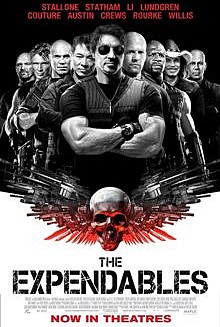
The Expendables, directed by Sylvester Stallone
An action thriller of the 1980s means a lone hero who usually is a loser, with big muscles, including the heart muscle, a big gun, and an acute sense of justice. New heroes and superheroes, with all their pumped-up muscular system, trendy gadgets, and complicated political agendas, have nothing in common with those video rental guys—the ones in T-shirts smeared with red and black, with gun belts crisscrossing their chests, trademark brief rejoinders, and thick blood. Now it’s only us, the true fans who are in love with them, who think they’re heroes. Girls don’t love them, the fools. Governments don’t like them, but governments don’t like anyone. Those heroes of old have knives, and years of combat training, which is something that we haven’t. Booknik columnist Ivan Pervertov watches The Expendables, and talks about many things while he’s talking about love.
Give Us One of Yours, and—
Yet again, Booknik’s own Talmud scholar Reuven Kipervasser tells about the friendship of Rabbi Yehoshua ben Levi, and immortal Elijah the Prophet. This is the story of a convoluted ethical problem, the story of a male bonding that is one of the most important values of the entire Talmudic culture, and the story of that friendship put to test.
The Hardboiled Eggs Broth
A long time ago, a small girl who later became our contributor Keren Pevzner visited her closest friend Elina. “Look,” Elina said in a conspiratorial tone, “they write about Israel here.” And she showed Keren a thick volume entitled The World Cuisines. They had everything there, Malaysian, Orinoco Indians, Eskimos, and other exotic stuff. In all this variety, Elina found an Israeli recipe. The only one in the entire book. So now, Keren Pevzner tells about eggs in Jewish cuisine.
…and many other revolutionary recipes in the Columns & Columns section.
Caim, by José Saramago
In August, Eksmo and Domino Publishers are putting out the latest and last novel by the late Portuguese author and the Nobel Prize winner José Saramago. The book is another reading of the Bible, and, like all Saramago’s readings of the Bible, it is fresh and new. In the novel Caim, God strikes a treaty with the protagonist, and Cain starts on a journey through the Old Testament times. He haggles with angels, builds the Tower of Babel, and assists Noah in constructing his ark. Nothing good is planned for Cain in this life, of course. It is clear even from the excerpt of the novel Booknik reprints.
…and many other amazing ampersands in the Stories & Essays section.
The History of Israel in Hebrew 24: I’ve Always Recommended Solzhenitsyn to My Officers
In 1835, a year before the end of his amazingly fruitful life, Alexander Pushkin complained that we are lazy and incurious. It can probably be said about the most humanity, but there are people whose lives always rhyme with the thirst for knowledge. Their busy schedules, their occupations or the number of hours in a day do not hinder them. Booknik’s talking head Arkan Kariv tells a story with a moral in it: no matter how busy you are, there’s always time for some reading and teaching.
The History of Israel in Hebrew 25: The Traitor
If someone is always being told that he’s an animal, eventually he turns into a beast. If the whole world wants something really bad, even a short word can become a well-aimed shot. If you sum all bursts of hatred up into years, you don’t have righteous indignation as a result, you have only evil brewed. Arkan Kariv tells another story with history.
Hebrarium, the Lexicon of Jewish Whatnots: K5
What is a Jewish collective farm? How does one become a member of the Knesset? Where did klezmers play? Watch our Hebrarium, and Booknik’s video wiz Kirill Chichayev tells you all about kibbutzim, the Knesset, and klezmer.
…and many other visual visitations in the Video Blog section.

The summer is almost over, sorry. The vacation is soon to be over, too. Sorry again. However, this does not mean anything special apart from the fact that you should spend these last days with as much sense as you can. You should see what you didn’t have time to see, do things you couldn’t do, and taste everything you didn’t. Iraida Stepnova reports what you can do these days in Riga, Tallinn, and Moscow.
53 Days to the Vacation
Tsatsiki Goes to School, by Moni Nilsson-Brännström
The books about the boy named Tsatsiki, and his incredible Mom who can perform handstands, and wiggle her ears, have already been translated into 20 languages and put to screens. Schoolchildren all over Europe know them, and their parents know them, too. These books tell about one excellent family where the kid is allowed to do everything he wants. He has everything that can make him happy. He misses only one thing, his father. Booknik Jr. reprints an excerpt from the book by the Swedish author Moni Nilsson-Brännström.
The Trumpet of Haim Levy
This area is tiny, you could walk around it in half an hour, but one could talk about it for a very long time. There are several synagogues there, for families are large, 10-15 people in each of them, and men and boys go to pray three times a day. This is why so many houses of prayer are a necessity. Yelizaveta Guller walks around the Jerusalem neighborhood of Sha'arei Hesed.
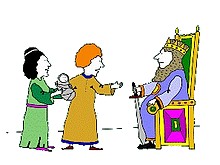
Marina Karpova and Yevgeny Levin tell our not-especially-grown-up readers 10 facts about King Solomon who was renowned for his wisdom, wealth, and piety. The main thing about him though is that he built the Temple.
Spoilt and Overrated?
All of us could’ve been high achievers, university professors, space explorers, and rock stars. However, here in Israel the children are overrated. They are praised for everything, even for a tidily written character. There is always something to praise a child for. Even if he or she brings a drawing the teacher doesn’t especially like, the teacher will say something good about a nice orange hue, and only then will criticize the work. And the kid will want to draw more, without thinking that he or she is no good in drawing. Miri Dror tells about the children’s successes, and instructs how not to discourage kids from learning.
…and many other instructive insights at Booknik Jr., also known as Family Booknik, our own web site for kids and their parents.
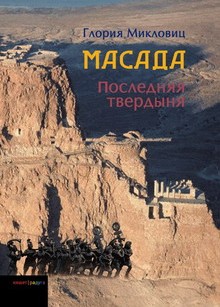
Booknik announces new releases in the book series Keshet/Rainbow, and Chase Collection published with the support of the AVI CHAI Foundation: Masada: The Last Fortress, by Gloria D. Miklowitz, and In Potiphar’s House, by James Kugel.
Fire bad, tree pretty. Booknik and Family Booknik are supported by the AVI CHAI Foundation.









